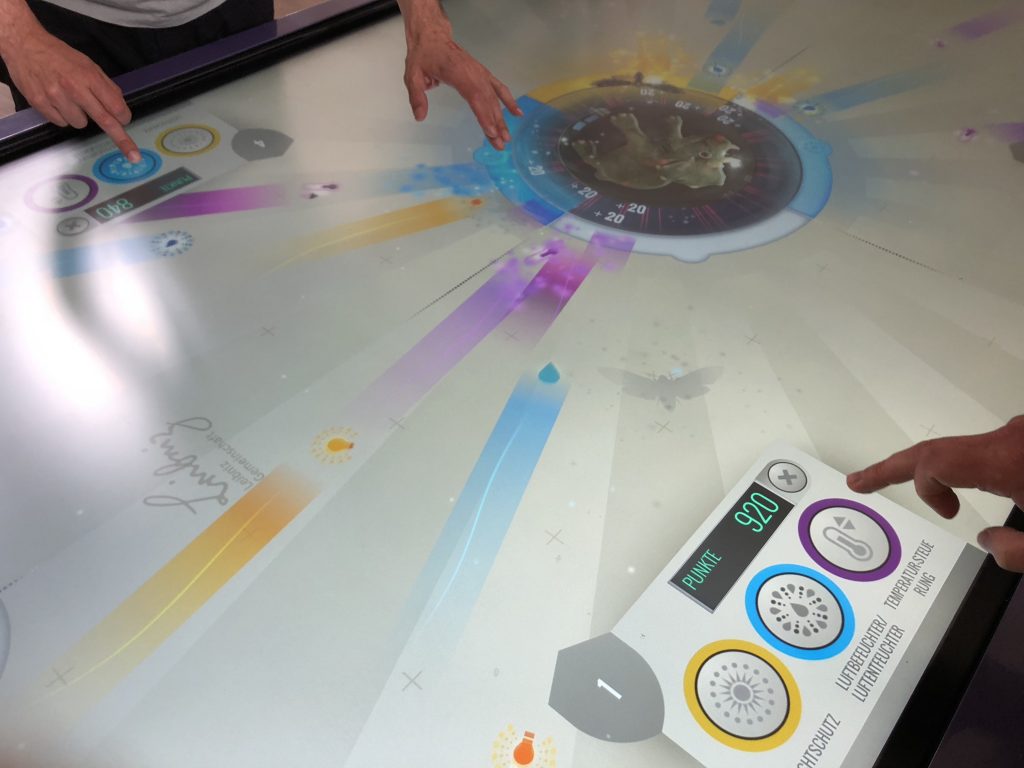How do you inspire children and young people to visit a museum? “Preferably playful, interactive and entertaining. And with technical solutions that are commonplace for the target group,” says media educator Anne Sauer. She is project manager at serious games specialist IJsfontein (NL/D) and designed a computer game for a multi-touch table and developed it together with the team.
This will be used in future in the eight research museums of the Leibniz Association on the occasion of the European Year of Cultural Heritage 2018. As the coordinator of this project part of the so-called action plan for Leibniz research museums, the German Mining Museum Bochum financed the development of the game. The project is intended to arouse interest in the scientific exhibits among the young target group, create understanding for the special handling of collection objects and promote awareness of the relevance of preservation and preservation.
“The main challenges lay not least in the heterogeneity of the target group. After all, 8-25 year olds should be picked up and excited in equal measure,” says Sauer. "At the same time, it was necessary to find a low-threshold, entertaining introduction to the complex subject matter of the various museums."
The result is a collaborative game with a fun factor, in which the players slip into the role of the "keepers" alone and in a team. The aim is to protect objects from the collections of research museums against harmful influences such as light, humidity, temperature fluctuations and insects.
The game can now be tested in the Senckenberg Natural History Museum in Frankfurt am Main. There is a small exhibition on the restoration history of the fossil skullcap of Sangiran II, a particularly well-preserved fossil of an extinct species of the genus Homo erectus, presents. The other research museums will follow suit in the coming weeks.
IJsfontein Interactive Media Ltd
IJsfontein Interactive Media is the German branch of the Dutch serious games specialist IJsfontein. As a company of WegesrandGroup offers game-based learning solutions and has many years of project experience, consulting and conception skills in the field of "games and education". Research projects and teaching activities also establish an extensive transfer of science and practice. The portfolio includes, among other things, serious games or gamification concepts such as employee training, interactive experiences in a museum or a digital platform for primary school lessons. Since 1997, more than 60 employees in the group have been working on projects with well-known companies, institutions and educational institutions that have received numerous awards. IJsfontein operates offices in Amsterdam, Mönchengladbach and Berlin. www.ijsfontein.de
Anne Sauer
Anne Sauer is a media educator and project manager at IJsfontein Interactive Media. Her work focuses on game design as well as project organization, planning and communication for the implementation of interactive applications. Together with customers, she develops playful and didactic applications as well as interactive installations, mainly in the field of culture, society, education and politics.
Contact
Office Berlin
IJsfontein Interactive Media Ltd
Waldemarstrasse 37A
10999 Berlin / Germany
Phone: +49 (0) 30 814 562 860
E-mail: kontakt@ijsfontein.de
www.ijsfontein.de
Headquarters
IJsfontein Interactive Media Ltd
August-Pieper-Strasse 10
41061 Mönchengladbach
Press and public relations:
brandvorwerk pr
Susanne Tenzler-Heusler
Phone: +49 (0) 173 378 66 01
Email: s.tenzler-heusler@wegesrand.net
The Leibniz Research Museums
The eight research museums of the Leibniz Association include the German Mining Museum in Bochum, the German Museum in Munich, the German Maritime Museum in Bremerhaven, the Germanic National Museum in Nuremberg, the Museum of Natural History in Berlin, the Roman-Germanic Central Museum in Mainz, the Senckenberg Society for Natural Research and the Zoological Research Museum Alexander Koenig in Bonn. These museums combine research and education in a special way. In addition to permanent and special exhibitions, extensive research on the history of the earth, biodiversity and the history of culture and technology takes place here. The unique collections include well over a hundred million objects and form the basis for science. With their exhibitions, the museums reach millions of people every year and thus make an important contribution to knowledge transfer.
Press contact for the Leibniz Association
Miriam Kaplow
Phone: 030 / 20 60 49 - 42
Mobile: +0172 8433549 XNUMX
kaplow@leibniz-gemeinschaft.de
